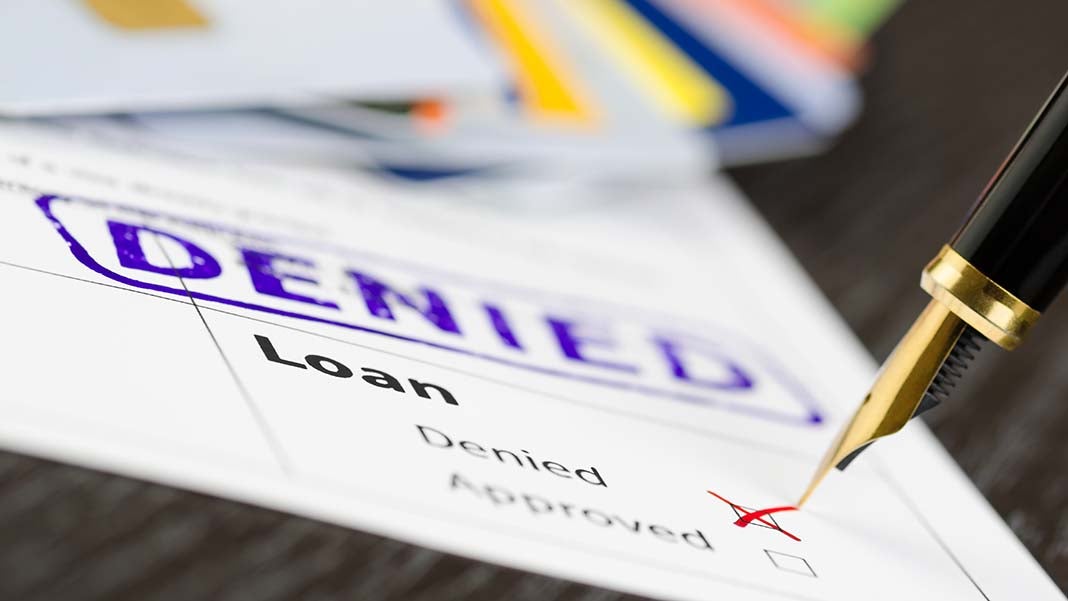9 Reasons You Were Denied a Small Business Loan
By: Meredith Wood

If you’ve just been denied a small business loan and find yourself asking why, the answer might lie in one of the nine reasons below.
We can’t supply a cure-all for fixing your loan application so that it has an approval guarantee, but we can help you identify weaknesses in your application and help prepare you for your next search for business financing.
Here the nine reasons why you might have been denied a business loan and how to improve your chances for next time.
1. You’ve got poor credit
Plenty of loan qualification criteria are subjective—your credit score, not so much. This three-digit number can make or break your loan application. If your personal credit score is less-than-desirable, many traditional lenders will move on to other borrowers.
As unfair as that sounds, remember that your credit score reflects a great deal about your experience as a borrower. Sure, you’ve never missed a credit card payment, but how diverse is your borrowing history? How long have you been borrowing and repaying large debts? Each of these factors plays a role in your overall credit score.
2. Your business is too young
Lenders want borrowers they can trust, with impressive track records of past success. You may not have that kind of documentation if your business is younger than two years.
If you’re already seeking out financing as a fledgling business owner, congrats! However, you may need to wait for your business to mature before hunting down your first business loan. Be patient until you hit that second (or even third) birthday, and a whole new world of financing options will open to you.
3. You haven’t paid your business taxes
Lenders view tax liabilities like any other debt. Unpaid taxes may reflect poorly on your reliability as a borrower. The next time you apply for funding, be prepared to explain why those business taxes aren’t paid up—or better yet, settle up with the IRS before starting your application process.
4. You’ve incurred a tax lien
If you’ve allowed your business taxes to go unpaid for too long, you’ve likely incurred a tax lien. That lien means the government can collect on its debts before any lender. As you might imagine, a lender forced to wait for you to settle your tax debt before they receive loan repayments isn’t likely to approve your application.
If you find yourself slapped with a tax lien, you can clear it provided you settle your debt or make a plan with the IRS to settle it in the future. Moral of the story: Never ignore notices from the IRS or state tax board.
5. You’ve filed for bankruptcy in the past
A bankruptcy on your credit history can damage your chances of securing a loan, no matter how valid your reasons for filing. Concealing a past bankruptcy won’t help, either—your lender will see delinquent accounts with no accompanying explanation.
Unfortunately, with a bankruptcy in your business’s past, you’ll likely face more frequent rejection from lenders and higher rates once you do secure funding. Remember, though, that businesses can and do bounce back from bankruptcy all the time.
6. You belong to a “high risk” industry
Lenders evaluate prospective borrowers on an individual level, but they also take a big-picture look at everything surrounding your business. That broader context includes your industry and its financial stability. Many lenders refuse to do business with industries they’ve flagged as “high risk,” and if your industry is on the red flag list, your otherwise stellar application may get passed over.
If you operate in the real estate, adult entertainment, gambling, restaurant, or investing industries, you may face rejection more frequently than a business in a more “stable” industry.
7. You submitted a weak business plan
Your business plan is a powerful component of your loan application. It’s your chance to illustrate how this loan will transform your business, demonstrate your commitment to its future, and provide context for the rest of the documents in your application.
A vague or disorganized plan, however, leaves your lender hanging. Overly optimistic projections and unrealistic timelines may also scare lenders away. Remember, too, that lenders want to hear how a loan will help your business grow, not remain at stasis. Make sure your business plan rises to the occasion.
8. You don’t have adequate collateral
Not every lender or loan product requires you to put up collateral. Those that do often have stringent criteria for what does and does not qualify. Real estate with large mortgages, for example, may not make the cut, as your lender won’t be able to seize the property in the event you default.
Your lender may accept your accounts receivable, inventory, etc. as collateral but deem yours too small an investment to be worth their while. You may need to consider a loan product without collateral requirements (and, in return, fewer protections on what a lender can and can’t seize after a default).
9. You approached the wrong lender
A rejection doesn’t necessarily mean there’s something wrong with you or your business. Rather, you may have simply pursued the wrong lender.
These days, term loans from traditional lenders are in short supply. Small businesses face steep competition for the best, most affordable loans, and not every business can access the funding they need. Alternative lenders seek to fill this gap and serve borrowers turned away for reasons like the ones listed above.
Spend some time identifying the likely causes of your rejection, and use that knowledge to inform which lenders you approach next. With enough savvy, you can find an alternative lender willing to lend to young businesses with less-than-perfect credit or limited revenue. Don’t give up the search—your business is counting on you!
4757 Views












